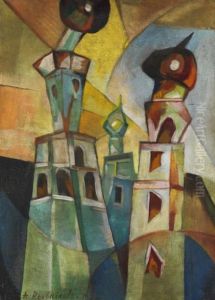Aleksei Rybnikov Paintings
Aleksei Yakovlevich Rybnikov is a Russian composer, born on July 17, 1945, in Moscow. He is recognized for his significant contributions to musical theater, cinema, and popular music in Russia and the former Soviet Union. Rybnikov is a prominent figure in the Russian music scene, and his works encompass a variety of genres, including symphonic music, operas, and songs.
Rybnikov's passion for music became evident at a young age, and he pursued his education at the Moscow Conservatory, where he studied composition. His career gained momentum in the early 1970s when he began composing music for theater productions. He achieved widespread acclaim for his work on rock operas, a then-novel genre in the Soviet Union, which combined elements of classical music with contemporary rock.
One of Rybnikov's most famous works is the rock opera 'Juno and Avos', which premiered in 1981 and became a cultural phenomenon. The opera’s songs became hits, and its melody is recognized by many in Russia. His other notable rock operas include 'The Star and Death of Joaquin Murieta' and 'The Very Same Munchhausen', both of which have enjoyed considerable success and have been integral in shaping the rock opera genre in Russia.
Apart from his work in musical theater, Rybnikov has composed scores for numerous films. His filmography includes music for well-known Soviet and Russian movies, which further solidified his reputation as a versatile and talented composer. His work in the film industry has earned him several awards, including the prestigious USSR State Prize.
In addition to his artistic endeavors, Rybnikov has taken part in various cultural and educational initiatives. He has been recognized for his contributions to Russian culture and has received numerous awards and honors, including the title of People's Artist of Russia.
As of my knowledge cutoff in 2023, Aleksei Rybnikov is still alive and continues to be an influential figure in Russian music and culture. Despite the changing musical landscape, his works remain an integral part of the Russian cultural heritage, and he is celebrated for his enduring contributions to the arts.
